
I knew it the day of the wedding, as I sat at the Formica kitchen table with my father watching Love, American Style, a silly 70s sitcom about what I did not possess.
I knew it as I stood at the altar, our right hands clasped, the well-lotioned fingers of my left hand twisting the wide

Computer generated 3d photo rendering.
gold band that felt unspeakably heavy.
I knew it as we got in my dad’s cobalt blue Mercury, the car we borrowed to drive to our Myrtle Beach honeymoon, a place where I was reminded that I didn’t know this man well enough to love him.
 Marriage was the end game in those days, what inevitably followed dating, football games, and fondling in backseats. Courtship illustrated Newton’s first law of motion: once in motion, it remained in motion unless an external force acted on it. Marriage was the culmination of the dream all little girls had back then, a dream wrapped up in toile and tiaras, security and worth. The only variation on the theme was whether you became a teacher (or a nurse or a secretary) before you got married or after, and how fast you abandoned the career to become a mother.
Marriage was the end game in those days, what inevitably followed dating, football games, and fondling in backseats. Courtship illustrated Newton’s first law of motion: once in motion, it remained in motion unless an external force acted on it. Marriage was the culmination of the dream all little girls had back then, a dream wrapped up in toile and tiaras, security and worth. The only variation on the theme was whether you became a teacher (or a nurse or a secretary) before you got married or after, and how fast you abandoned the career to become a mother.
My father said Rick wasn’t good enough for me. My father said I was too young at nineteen, the same age my mother was when she got married. My mother said women  marry men like their fathers, and that’s why mothers cry at weddings. But before my mother and father said anything, I said, “Yes,” and I would never have to listen again to what my parents said.
marry men like their fathers, and that’s why mothers cry at weddings. But before my mother and father said anything, I said, “Yes,” and I would never have to listen again to what my parents said.

At the TKE House the summer after we started dating
To the casual observer, I was a woman in love. For years I’d been testing my signature in pink ink on my spiral notebooks: Mrs. Sandy Lingo, Mrs. Richard Lingo, Mrs. Sandra Seilkop Lingo.
 I exuded love as I opened gifts at my shower: steak knives; a gravy boat; two fondue pots. I professed love as he and I wrote our vows, a practice that became fashionable in the seventies. I looked lovingly into his eyes when I read Khalil Gibran at the altar. But I knew then what I know now: I didn’t love my husband the day we married.
I exuded love as I opened gifts at my shower: steak knives; a gravy boat; two fondue pots. I professed love as he and I wrote our vows, a practice that became fashionable in the seventies. I looked lovingly into his eyes when I read Khalil Gibran at the altar. But I knew then what I know now: I didn’t love my husband the day we married.
This is not to say that I loved him any less than the bevy of confident Cincinnati brides who also walked down the aisle that steamy August, 1972, the women who proclaimed their undying, life-altering love for their grooms. Maybe they were just playing a part, as I was. Or maybe they didn’t overthink as I did. But it is a fact that they really couldn’t love their grooms, no matter what they thought or said, just as I couldn’t.

Honeymoon at Myrtle Beach
Well, maybe there’s a brand of love that they had, and even I had. The shiny kind that’s wrapped up in grocery shopping where you asked those newlywed questions: “Do you like broccoli? What do you want me to pack you for lunch?” The married brand of love that sanctions sex. The love that loves to say, “My husband.” And the love that blooms in the certainty that you are an adult and will never have to live with your parents again.
But real love? I’ve come to understand in the 47 years I’ve known my husband that you don’t fall in love, find love, or discover love. You make love.
Of course we “make love,” the kind that resulted in two conceptions, but also the hurried kind in back seats and woods, and even in hotel bathrooms while our children slept. There was a day when we were quite randy, when we lied to our parents, when we waited anxiously for them to go to work, when we were horrified when they returned ahead of schedule. Even now, our two lumpy bodies occasionally bump into each other on the rare night.
But when I say we “made love,” I also mean th at we created it, we built it.
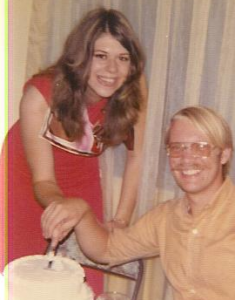
First Anniversary
In the beginning, love was so shallow a pool that those annoying habits he (and dare say, I) had were, well, really, really annoying. It was hard to accept his shyness, his fussiness, his eye rolling, his gnarly toenails. And he had trouble accepting my fourteen pairs of shoes littering the floor, my profuse tears and honking laugh, my pathological work ethic. When the well of love is so shallow, it’s hard for that flotsam to float away. Those faults beach on the shore, and you just keep stepping on them—the drift wood, the broken glass, the barnacles. There were times when I’d look at him and think, who is this man, and why must he be mine?
The real troubles were few in the early years, and that’s a blessing, because our love was not yet strong enough to endure them. Our crises were limited to the leaky basement, the puppy that chewed our couch, the red Chrysler that stalled every time it rained. We weren’t ready for the heavy lifting that comes with a long married life.
Then our first daughter was born, and just sixteen months later our second. After seven years of marriage, we had finally jumped into the big pool. Now everything mattered—a lot. I quit work and tried to figure out how to mother. It was easy to love my children—falling in love this time  was exactly what I did–but I never felt as good about myself as a mother as I had when I was a teacher and collected a paycheck.
was exactly what I did–but I never felt as good about myself as a mother as I had when I was a teacher and collected a paycheck.
In the days before FB, texting, tweeting, videos, and 50 television networks, it was lonely being a mom. There was no entertaining background sound to drown out the baby’s wailing as I wore a path around the dining room table walking, patting, and bouncing her. I second guessed every decision and cursed every mistake. Diaper rash and colic and a three-year-old with a pacifier seemed like all my fault. Rick and I were both rookie parents, and our disagreements about how long to let the baby cry, when to feed the baby, how many layers of clothes the weather required began as soon as the babies came home from the hospital.
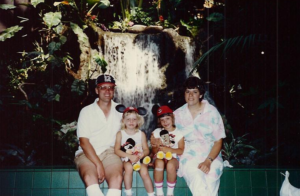 In this milieu, we faced harder stuff. For a few months in the ‘80s during the Carter years, we owned two houses and had only one salary, and then our car died. That puppy that had once ingested a sofa had grown into a jealous mutt who bit our toddler, and we had to give the dog away. My four grandparents, one after another, but in their own unique ways, got frail and sick, and we assumed some responsibility for their care. My mother checked into rehab for her alcoholism. I went back to work.
In this milieu, we faced harder stuff. For a few months in the ‘80s during the Carter years, we owned two houses and had only one salary, and then our car died. That puppy that had once ingested a sofa had grown into a jealous mutt who bit our toddler, and we had to give the dog away. My four grandparents, one after another, but in their own unique ways, got frail and sick, and we assumed some responsibility for their care. My mother checked into rehab for her alcoholism. I went back to work.
It was a hard time, and yet we managed to tread water, and in time found we could take long easy strokes in love that was becoming deeper. With every problem we solved, every slight we forgave, every flaw we ignored, we were making love.
Perhaps you are familiar with the concept of resistance training: You gradually overload your muscles so they get stronger and the bones get heavier. It dovetails nicely with the “no pain, no gain” dictum of exercise. Such is love. The enduring of troubles and the solving of problems—the coming out on the other side—is what makes love grow stronger.
In the meantime, though, when our relationship was new, we made do with courtesy kindness, and selflessness in place of deep love. But here’s the beauty: courtesy, kindness, and selflessness are not just precursors of love, they build love.
I found when I was considerate of my spouse, that care was returned to me. I would have hot chocolate waiting for him when he got back from a Bengals football game, and the next day I came out of the shower and saw that the bed was made. I listened as he went on (and on) about his bad day, and the next day he’d want to know how my presentation at work was received. I’d empty the dishwasher, and he’d fill the gas tank. And before I knew it, we were counting on each other. I knew he’d have my back. We were a team.
I learned that when you treated your spouse like your best friend, he becomes your best friend.
We found ourselves hatching elaborate plans to make each other feel happier, calmer, or safer. I planned a surprise trip to New York on his fortieth birthday. I scheduled doctors’ appointments for his mom and took her. When my mother was in rehab for thirty days, Rick had a little present waiting for me under my pillow every night when I came home from visiting her. Once he surprised me with a brand new fire engine red Cavalier when I came out from Panera with my friends. And when I totaled that shiny car a year later? He said, “It’s just a car. You’re okay, and that’s all that matters.”
We started having married conversations, composed of sentences lacking subjects or predicates, yet we completely understood each other:
“Don’t forget the . . .”
“I won’t. When will . . .’
“Twenty minutes.”
“Be . . .”
“I will. I love . . .”
“Me too.”
Everyday life became a well-rehearsed play. He loaded the dishwasher, and I rearranged it. He put his book on the nightstand, and I turned off the light.
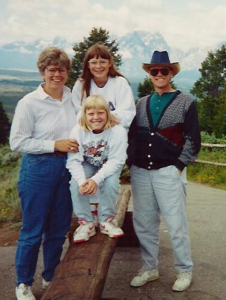
Dude Ranch
We accumulated shared memories: one of the kids saying “movie thatter” and “getfor”; the other one getting diarrhea at the Leaning Tower of Pisa; all of us crying when we drove away from our wonderful vacation at Peaceful Valley Dude Ranch; devouring a pile of shrimp in Calabash; mopping the flooding basement in our first house. Songs (“You Make Me So Very Happy”), foods (mock turtle soup); sitcom episodes (Seinfeld) will make us pause and ponder these place holders in our lives together. And there are the inside jokes that only we understand. We will go to our graves without revealing why the word “Arkansas” makes us laugh.
We mastered the silent choreography of team work. When I threw a kid’s wet sheets down the steps at 2:00 AM, he was waiting to catch them and throw them in the washer. When we have company, he freshens the drinks while I whisk the gravy. He vacuums while I dust. I cook, and he loads the dishwasher. I spend the money, and he pays the bills.
After a good long while, I stopped complaining about the toilet seat, his obsession about sports, his interrupting me. And after a longer time still, some of the things that used to drive me crazy became endearing. Now I smile when he mispronounces the word he always mispronounces, warns me to dress warmly, criticizes the wine based on his two-week Italian vacation experience. Because he is who he is and, after all, I haven’t changed all that much either.
But even strong marriages will nearly collapse at intermittent periods. The couple argues about how to discipline a child. One spouse learns something about the other that shatters trust. Someone drowns in the black hole of clinical depression. The wife experiences a wave of ennui. The husband admires a neighbor’s bottom.
It is not hyperbole to say that there were several times when one or both of us were ready to walk out. There is the
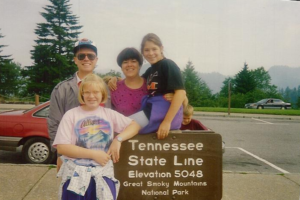
“seven year itch,” that’s for real, but there are also the multiples of seven that are danger periods. I recall a rough patch at seven years, when we struggled with infertility, and at 28 years, when we were adjusting to an empty nest. And at forty years I got so tired of his kvetching and criticizing and pontificating that I almost drowned him in the Great Barrier Reef. We once went to counseling, but through other storms, we just rode it out, declared temporary detente, and suddenly and unpredictably the sky would clear and we’d have smooth sailing for a good long while. It comes down to two people who want to make it work, who never threaten to leave, who never say the word “divorce.”

First cruise
After decades, something really horrible inevitably stresses marriages, a sadness so great you think you won’t recover. An illness, divorce, or deception in your family. The betrayal of a friend. A collapsing economy. My grandpa, with advanced Alzheimer’s, took our car and drove away. Our daughter’s marriage collapsed. I became the primary caregiver for an elderly friend.
And during these times, I turned to him and felt awash in my love for him. I discovered that I have an ally in this war called “life.” I realized we had built a fortress of love so strong that nothing could compromise its foundation.
And just when you rely on this foundation, believe that you will always be there for each other, then you realize that you won’t.
“I feel this twinge in my chest,”  Rick told me three years ago.
Rick told me three years ago.
“Is it like an elephant sitting on your chest?
“No, it’s just a twinge.”
And you are shocked when he almost dies from the twinge. While you wait until he gets out of surgery, you really understand how much you depend on him, not just for paying the bills and changing the air filters and DVRing Modern Family—those things you could, if you had to, figure out.
But you know that if the part that completes you dies, you will never be the same. You know this love you’ve made, something you thought was so durable, could evaporate in an instant. If you are lucky, as I was, that episode will just be a dress rehearsal for the inevitable loss, and every day from then on you’ll be grateful that you have made love.
Having married at nineteen, I never had the other kind of love. The kind that has a short shelf life, the kind like junk food that tastes really good for a while, but leaves you with a torturous low. The kind of love that results from casual relationship exercise, like daily crunches and leg lifts that keep your stomach flat and your thighs in check, but does 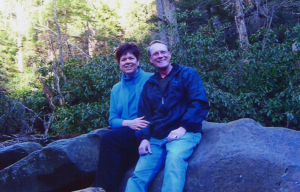 nothing to strengthen your heart.
nothing to strengthen your heart.
I can see the advantages of this kind of love. You can serially commit, never sweat the hard stuff, sample many different kinds of love. You never have to tolerate, well, anything—not his petulance, his insecurities, his relatives, his toenails. You can take the “better” without enduring that inevitable slide into “worse.” You will not have to watch his hair thin, teeth yellow, or memory fail.
 The other kind of love, the kind you build over decades, is that deep kind of love that requires commitment—a decision that you will not walk away. A decision that you won’t question if there is someone better for you. A decision that you won’t measure your marriage by happiness but by steadfastness.
The other kind of love, the kind you build over decades, is that deep kind of love that requires commitment—a decision that you will not walk away. A decision that you won’t question if there is someone better for you. A decision that you won’t measure your marriage by happiness but by steadfastness.
This is what I want to tell my adult daughters: I can’t tell you if one type of love is better, but I am so grateful that your dad and I decided to make love. That love you build brick by brick is a comfort when the children and the career and the youth are gone. I evolved into a better person as a result of the give and take, the ebb and flow, the suck-it-up demands of marriage. I am better not just for your father, but also for my friends and family.
Romantic love is great in all its variations, but whether or not that love endures will not depend on the alignment of the stars, but on the decision to make it. You make love in bed, of course, but just as surely, you make love in all the little ordinary moments you share, like sitting in side-by-side recliners, computers in your laps, watching Modern Family, already in your pajamas at 7:00 at night.
This post is dedicated to my husband on our 44th anniversary. He is a great guy!

Copyright © 2016 Sandy Lingo, All Rights Reserved
Read more posts about marriage:
Why Women Love to Be Home Alone
Life, Death, and Fish Tacos: The Absolutely True Story about a Medical Mistake
How to Travel With Your Husband Without Killing Him
My Daughter’s Love Affair With a Viking
Three Weddings: A Secret One; A Surprise One; A Long-Awaited One
Downsizing: We Sold Our House and Everything In It
Role Reversal on a Trip With Adult Children



After finishing your blog…..I had to ask myself, “what did I just read?” You gave me an entirely different view of marriage.
I guess when you are very young and marry, you are just beginning to “grow up” and find who you are and what you want in life. That takes a lot of searching to do together when that part of life is so personal.
I am amazed at how you two “plugged” through so much together and never gave up. This is proof that so much is your willingness to make a lasting committment and realize what REAL love is! However it does take two great people!!
Trust me when I tell you (at almost 81) that it keeps getting better. Real love is so special!
I love your writing…..it reads like you are just talking to me.
Hope to see you soon….miss you!
This is so beautiful, Sandy! This kind of love is a true miracle. I could see my own marriage in your writing. Thank you for sharing!
Sandy, I agree with all the comments above but have an addition of my own. I was a 21 year old bride in 1951, after agreeing to marry my young husband -23 and in the Air Force-after his third proposal. We had 3 daughters, I taught school, we traveled, we had arguments (mostly me, not him), we had very different interests, but here we are, 64 1/2 years later, still together. However, he’s now in the bedroom under hospice care with terminal heart failure and life has changed drastically. I’ve done gross tasks I never thought I could do (Nancy Nurse I am not), but I find I do them willingly, with love and thankfulness for so many good years. You are so correct–love grows.
Jane
Inevitably, this sadness is part of a lifelong marriage. Bless you as you give this final gift to your husband. Take care of yourself, as I know he wants you to. I think of you often.
This was a beautiful, thoughtful, and inspiring piece of writing. Thank you for sharing your wisdom.
You are so kind to read and respond this old lady’s reflections. I think you two are making love!
Coming up on 40 years this October. Thanks for the beautiful testament to how it happens. I especially like the married couple conversations.
Thanks for reading and responding. I am glad it resonated with you. Looking forward to spending time with you in poetry class.
Sandy, this was such a beautiful, honest and thoughtful piece…giving insight to the truth behind building the foundation to a steadfast love! I think this might be my favorite of all your amazing blogs. The photos were great! Happy Anniversary!!!!
Thanks so much. I am so glad you found this post engaging. It has been my most popular posts ever. It’s gratifying that what you’ve been mulling over in your mind ends up having universal appeal. You are sokind to take the time to comment.
A beautiful meditation on enduring love. I must say, I have been a sampler and not endured the worse in another for an extended period of time. You two are the exception today – Congrats!
Thanks so much for reading and responding to my post. Did you launch your blog yet? Don’t forget to add my email to your mailchimp list.
What a beautiful tribute to love and marriage. Every word rang true!
Thanks so much, Barb. Looking forward to reading your book!
Bravo, Sandy-you nailed it. Loved visiting your blog. Margie– (Bonnie’s sister)
Hello, Bonnie’s sister! Is my apartment building still standing. I bet you gals are having a blast. Thank you for reading and responding to my post. I am so gratified that it resonated with you.
You have spoken to so many of us who married so long ago. I love your title as it is so true. I am sad that I was not married long enough to continue to make love in a authentic way. Ken died 20years ago next year. We did have 27 years together and we were just moving into a way of making love in our grown up lives together. Thank You Sandy you are a gifted writer and touch so many in a genuine thread.
Thank you, thank you, dear friend for your kind words. Yes, you and Ken were just headed to that easy street time of marriage. I am so sorry for your loss, the love of our life.
Beautiful, Sandy. Thank you.
Sandy–I really enjoyed reading your words and your thoughts. Several of your points rang true for me and I appreciate your beautiful writing. Thanks for sharing this. Patti (Woodcock) Jervis
So beautifully written and so much is oh so true and as you are basking in the memories of all you have created together and all you have built together ..and after learning what you think love is because of all that time and lifes tribulations – tell me how would you react to the newfound knowledge that he had been sleeping with another woman for the last 15 of the 43 years? – too bad it doesn’t always end with lilies and roses …
One of the best columns you’ve ever written–refreshingly honest and deeply felt. You are an articulate voice for so many women and I love reading your words.
Yes!!!
That means a lot coming from such a brilliant writer.
I thought this was incredibly insightful and it struck many chords for me (I could be a player piano now!) and having just gotten engaged,(this will be by third marriage) you have made me see that it’s not amazing chemistry or good timing or random compatability– it’s completely within my control to build something wondrous and ever-lasting. But it will be real and raw and sometimes messy. You’ve given me an engagement gift…. You have modified my expectations. Thank you!!
Wishing you much love and happiness in your marriage. I will be emailing you a personal message. Thanks for reading and responding.
Thank you. I’ll be sharing.
Thank you.
So tender an well said. Happy Aaniversary and many more. Loved this one.
Did you get my text yesterday?
I did get your text and remembered the years when we grew zucchini and all summer long filling the freezer with loaves of the stuff. Now, I can’t remember the last time I made it or even where the recipe is! Happy Anniversary to you two.